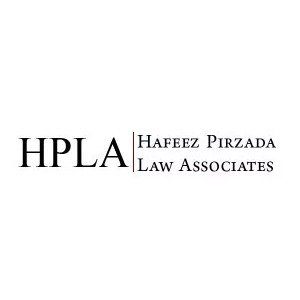Best Property Insurance Lawyers in Karachi
Share your needs with us, get contacted by law firms.
Free. Takes 2 min.
List of the best lawyers in Karachi, Pakistan
About Property Insurance Law in Karachi, Pakistan
Property insurance in Karachi, Pakistan, is a significant aspect of securing one's assets against potential risks such as fire, theft, natural disasters, and other unforeseen events. Property insurance laws in Pakistan are primarily governed by the Insurance Ordinance 2000 and various subsequent regulations guided by the Securities and Exchange Commission of Pakistan (SECP). These laws delineate the rights and responsibilities of both insurance providers and policyholders. In Karachi, where real estate values are substantial and risks of natural calamities and urban development are factors, having a comprehensive property insurance plan is vital for homeowners, business owners, and investors.
Why You May Need a Lawyer
Legal assistance in property insurance can be crucial for various reasons:
- Policy Complexity: Insurance policies can be complex documents with numerous terms and conditions. A lawyer can help clarify these terms to ensure you fully understand your coverage.
- Claim Disputes: If an insurer disputes your claim, a lawyer can advocate on your behalf for the benefits you are entitled to receive under your policy.
- Contract Negotiation: When entering into a property insurance contract, a lawyer can assist in negotiating terms that are more favorable and comprehensive.
- Legal Compliance: Lawyers ensure that you are compliant with all local regulations and help you understand how policies are impacted by local laws.
- Fraud and Misrepresentation: In cases of suspected fraud either by or against policyholders, legal expertise is crucial in resolving these issues.
Local Laws Overview
In Karachi, the property insurance sector is largely regulated by the Insurance Ordinance 2000. Key aspects to understand include:
- Regulatory Body: The SECP is responsible for overseeing insurance activities, ensuring fair practice, and protecting policyholders.
- Contractual Obligations: The principle of utmost good faith governs contracts, requiring full disclosure from both parties.
- Indemnity Principle: A fundamental concept where the insured cannot profit from a loss and can only be compensated to the extent of the loss.
- Insurable Interests: A valid policy requires the insured to have a financial stake in the property.
Frequently Asked Questions
What is property insurance?
Property insurance offers financial coverage or reimbursement to the owner or tenant of a structure and its contents in the event of damage, theft, or natural disaster.
How are property insurance premiums calculated in Karachi?
Premiums depend on various factors such as the property’s location, value, types of coverage chosen, risk exposure, and claims history.
What are “named perils” and “all-risk” policies?
"Named perils" policies cover specifically listed risks, while "all-risk" policies offer broader coverage, excluding only those perils that are specifically outlined in the contract.
Can I insure any type of property?
Yes, various types of properties such as residential, commercial, and industrial properties can be insured, subject to the insurer’s terms and conditions.
What should I do if my claim is denied?
If your claim is denied, review your policy terms and the insurer’s explanation first. Consider consulting a lawyer if you believe the denial was unjustified.
Am I covered for natural disasters?
Coverage for natural disasters depends on your specific policy. Make sure to check if events like earthquakes or floods are included under your protection plan.
How does inflation affect my property insurance?
Inflation can increase property replacement costs, potentially requiring an adjustment in coverage limits to ensure adequate protection.
What documentation is required for filing a claim?
Typically, you will need to provide proof of loss, evidence of ownership, original policy documents, and any additional information requested by the insurer.
What is a deductible and how does it work?
A deductible is the amount you are responsible for paying out-of-pocket before your insurance coverage kicks in. A higher deductible can lower your premium.
How do I choose the right insurance provider?
Select a provider based on financial stability, claim settlement reputation, available coverage options, and customer service track record.
Additional Resources
Here are some resources that can provide further assistance regarding property insurance in Karachi:
- Securities and Exchange Commission of Pakistan (SECP): Oversees insurance regulation and provides consumer protection information.
- Insurance Association of Pakistan (IAP): A body that includes leading insurance companies offering guidance and resources.
- Local Legal Aid Societies: Can offer initial consultations and pro bono advice for those requiring assistance.
- Consumer Protection Departments: Offer support for policyholders facing grievances with their insurers.
Next Steps
If you need legal assistance with property insurance in Karachi, consider the following steps:
- Research and Seek Referrals: Look for qualified property insurance lawyers or law firms with a good reputation and experience in this field.
- Initial Consultation: Schedule a consultation to discuss your situation and understand the legal services they can provide.
- Documentation Preparation: Gather all relevant documents related to your property insurance to present an organized case.
- Discuss Fees and Charges: Make sure to understand the fee structure, including any upfront fees or contingency charges.
- Engage Legal Services: Once satisfied, engage their services and work closely with them to navigate your property insurance needs effectively.
Lawzana helps you find the best lawyers and law firms in Karachi through a curated and pre-screened list of qualified legal professionals. Our platform offers rankings and detailed profiles of attorneys and law firms, allowing you to compare based on practice areas, including Property Insurance, experience, and client feedback.
Each profile includes a description of the firm's areas of practice, client reviews, team members and partners, year of establishment, spoken languages, office locations, contact information, social media presence, and any published articles or resources. Most firms on our platform speak English and are experienced in both local and international legal matters.
Get a quote from top-rated law firms in Karachi, Pakistan — quickly, securely, and without unnecessary hassle.
Disclaimer:
The information provided on this page is for general informational purposes only and does not constitute legal advice. While we strive to ensure the accuracy and relevance of the content, legal information may change over time, and interpretations of the law can vary. You should always consult with a qualified legal professional for advice specific to your situation.
We disclaim all liability for actions taken or not taken based on the content of this page. If you believe any information is incorrect or outdated, please contact us, and we will review and update it where appropriate.















